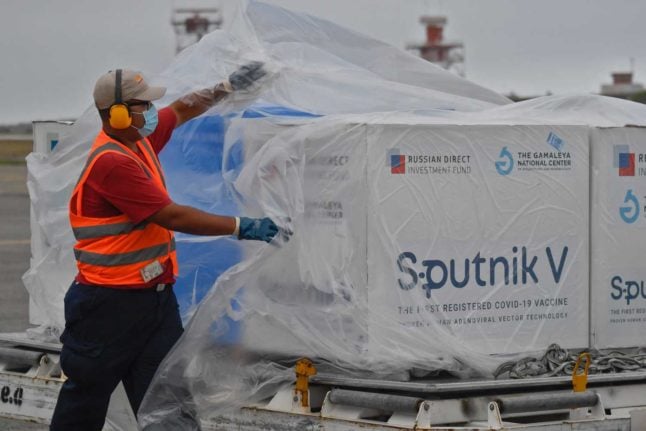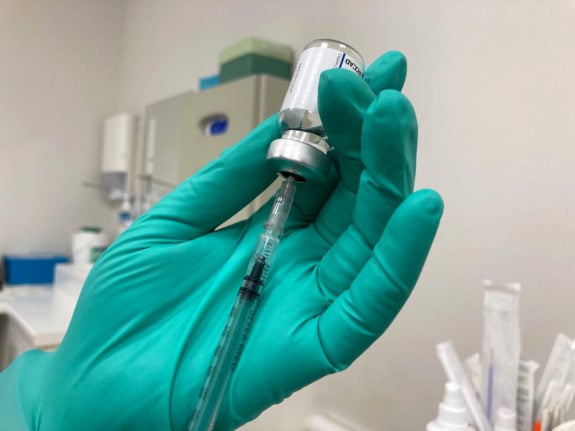The creators of Sputnik confirmed in a message on their Twitter feed on Thursday evening that “discussions” had begun.
They said German government officials were in talks with the Russian Direct Investment Fund (RDIF), which financed the development of the vaccine, for an advance purchase contract for Sputnik V doses.
Will Germany buy the vaccine without EU support?
Amid divisions in the bloc over Sputnik, Health Minister Jens Spahn had earlier said Germany was prepared to go it alone without the other 26 members if it meant the country could speed up its inoculation campaign.
“The EU Commission said yesterday that it will not sign contracts (for Sputnik) like for other manufacturers — such as BioNTech, for example — so I said… we will hold bilateral talks with Russia,” Spahn told public broadcaster WDR.
READ ALSO: German vaccine boss praises Russian vaccine as ‘clever’
“To really make a difference in our current situation, the delivery would have to come in the next two to four, five months — otherwise we’ll have more than enough vaccines,” Spahn said, stressing that any purchases remain contingent on European regulatory approval of the Sputnik jab.
He said Germany was seeking a “binding commitment on which amounts specifically could reach Germany after regulatory approval and when”.
Why is Germany eager to purchase the vaccine?
Germany has until now coordinated its vaccine buying with the EU.
Since inoculations began in late December, Germany has deployed vaccines produced by Pfizer-BioNTech, AstraZeneca and Moderna.
A fourth, from Johnson & Johnson, is expected to be rolled out across the bloc in the coming weeks.
But the southern German state of Bavaria said Wednesday it had signed a letter of intent to buy up to 2.5 million doses of the Sputnik V vaccine if it is approved by the European Medicines Agency (EMA).
READ ALSO: Bavaria becomes first German state to reserve Russia’s Sputnik vaccine
And on Thursday the thinly populated east German state of Mecklenburg-Western Pomerania, where the hotly disputed Russia-Germany gas pipeline Nord Stream 2 is nearing completion, pre-ordered one million Sputnik doses.

“We’re currently in a phase in which we’re highly dependent on too few manufacturers,” the state’s health minister Harry Glawe was quoted by DPA news agency as saying.
Chancellor Angela Merkel has previously said that Germany “should use any vaccine that has been approved” by the EMA, including the Sputnik vaccine.
Germany’s comparatively slow vaccine rollout has become a lightning rod issue as it grapples with a fierce third wave of the pandemic.
Only 13 percent of the population has received the first of two doses, as the country reported more than 20,000 new infections on Thursday and more than 300 deaths in 24 hours.
However, on Tuesday family doctor practices around the country began offering the vaccination, leading Germany to offer a record 656,000 jabs within one day on Thursday.
Why is the move to buy the vaccine so controversial?
But any agreement with Russia could be controversial as the two countries are at loggerheads over issues including repeated Russian cyberattacks against the West, the Kremlin’s treatment of opposition leader Alexei Navalny and escalating tensions on the Ukraine border.
The EMA has launched a rolling review of Sputnik V, which could become the first non-Western coronavirus vaccine approved for use across the 27-nation bloc.
Ukrainian Foreign Minister Dmytro Kuleba on Thursday warned Germany that the Sputnik vaccine would come with strings attached.
“Russia is using it as a tool to increase its political influence,” Kuleba told Germany’s Bild newspaper.
He said he suspected that any Sputnik purchases would be used as propaganda by the Russian government to suggest that “even a country as strong as Germany can’t solve its problems without Russia”.
READ ALSO: Germany set to finish controversial Russian pipeline despite US protest
Russia has also faced criticism in some Western countries, and French Foreign Minister Jean-Yves Le Drian accused Moscow and China of using their vaccines to gain influence abroad.
EU Internal Market Commissioner Thierry Breton, long sceptical about Sputnik, said he doubted a Russian or Chinese vaccine could be deployed quickly enough to meaningfully help the campaign.
“Can they add to Europe’s portfolio of vaccines and add to our summer 2021 immunity target? I’m afraid the answer is no,” he said.
Russia registered Sputnik V in August ahead of large-scale clinical trials, prompting concern among experts over the fast-track process.
But later reviews have been largely positive, with the medical journal The Lancet publishing results showing it to be safe and more than 90 percent effective.



 Please whitelist us to continue reading.
Please whitelist us to continue reading.
Member comments